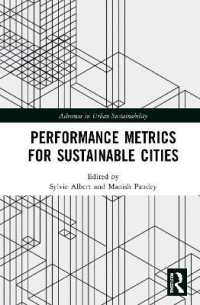- ホーム
- > 洋書
- > 英文書
- > Science / Mathematics
Full Description
Nanobiotechnology has emerged as an innovative and rapidly advancing field that combines the progress of nanotechnology with biological sciences, especially cellular and molecular biology. Several metal and metal-oxide nanoparticles (NPs) have shown great potential in boosting the performance of agricultural crops under challenging conditions. NPs enhance plant resistance to stress by strengthening physical barriers, facilitating the uptake and transport of essential minerals and nutrients, improving photosynthetic efficiency, increasing the synthesis of anti-stress compounds, and modulating hormone balance, mainly auxins and gibberellins, thereby promoting plant tolerance to various abiotic stresses. Due to their high surface energy and large surface-to-volume ratio, NPs exhibit superior bioavailability and bioactivity compared to their bulk counterparts. This book offers readers a thorough, up-to-date overview of how NPs impact crop responses at the molecular, cellular, metabolic, biochemical, and physiological levels, particularly under stressful conditions. In terms of physiology, NPs enhance stomatal behavior, boost photosynthesis, improve water use efficiency, and promote seed germination and growth. Biochemically, they alter metabolite profiles, reduce the accumulation of reactive oxygen species, and increase the activity of various antioxidant enzymes. NPs also improve lipid, protein, and glucose metabolism, as well as better regulate secondary metabolites like flavonoids and phenolics. At the cellular level, NPs help maintain osmotic balance, ion homeostasis, and membrane stability. On a molecular level, they affect stress-responsive transcription factors, influence gene expression, and impact signaling pathways such as calcium signaling. However, NPs can also have negative phytotoxic effects, such as inhibiting germination, stunting plant growth, disrupting cellular metabolism through oxidative stress, and damaging proteins and DNA, ultimately leading to reduced crop yield and performance. These adverse effects are typically observed at higher NP concentrations, though they can vary by plant species. Therefore, it is essential to standardize different NP formulations, concentrations, and delivery methods for various crop plants. This book is an invaluable resource for advanced students, faculty, scientists, and researchers in fields such as nanobiotechnology, plant biology, plant biochemistry, plant physiology, plant stress physiology, plant microbiology, soil microbiology, agricultural sciences, botanical and crop sciences, environmental botany, and related disciplines.
Contents
Significance of nanoparticles to modulate crop responses at physiological, biochemical, metabolic, cellular, and molecular levels under abiotic stress conditions.- Role of metal and metal-oxide in agricultural crops salinity stress adaptation and mitigation.- Role of metal and metal-oxide in agricultural crops drought stress adaptation and mitigation.- Role of metal and metal-oxide in agricultural crops heavy metal stress adaptation and mitigation.- Role of metal and metal-oxide in agricultural crops mineral nutrient deficiency stress adaptation and mitigation.- Role of metal and metal-oxide in agricultural crops extreme temperatures stress adaptation and mitigation.- Role of metal and metal-oxide in agricultural crops flooding stress adaptation and mitigation.- Role of metal and metal-oxide in agricultural crops Ultraviolet (UV) radiation stress adaptation and mitigation.- Nanoparticles crosstalk or interaction with phytohormones for agricultural crops flooding stress adaptation and mitigation.- Nanoparticles crosstalk or interaction with gasotransmitters or signaling molecules for agricultural crops flooding stress adaptation and mitigation.- Nanoparticles crosstalk or interaction with beneficial microorganisms for agricultural crops flooding stress adaptation and mitigation.- Comparative evolution of the crop performance due to exposure of chemically and green synthesized nanoparticles under abiotic stress situation.- Interaction of arbuscular mycorrhizal fungi and nanoparticles in a soil matrix for enhanced plant growth and production under abiotic stress situation.- Changes in crop plants gene expression in response to nanoparticles exposure under abiotic stress situation.- Crop plants proteomic study on the effects of nanoparticles exposure under abiotic stress situation.- Specific physiological and molecular response of nanoparticles exposure to crop plants.- Long-term effects nanoparticles, safety concerns and optimal application methods of NPs in agricultural crops.








